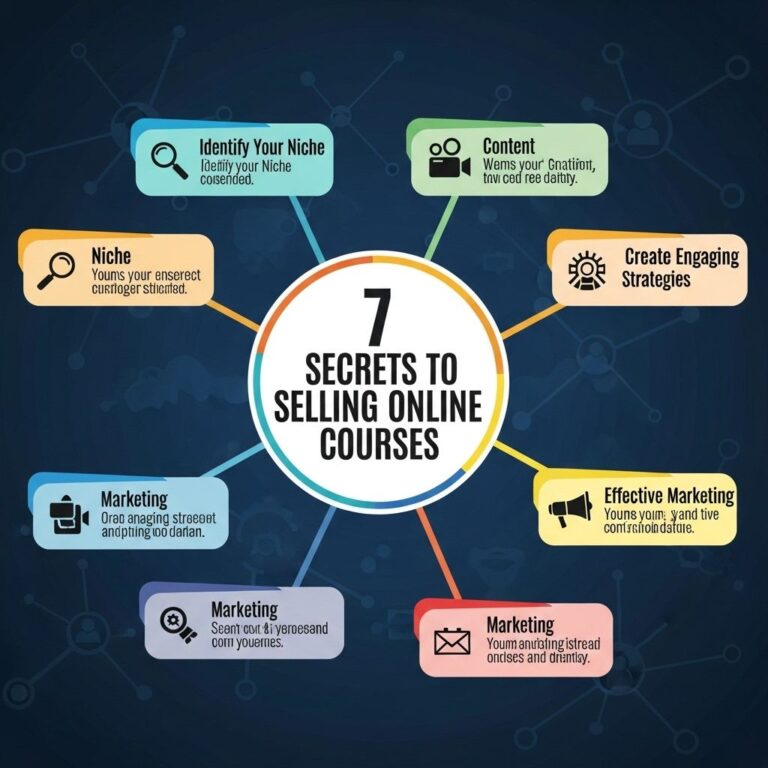In today’s digital age, the opportunity to earn a substantial income has never been more accessible, thanks to the rise of online education platforms. With the right approach, you can create and sell courses online, tapping into a market that is hungry for knowledge and skills. This article will delve into how you can effectively monetize your expertise and potentially generate $5,000 or more each month.
Table of Contents
Understanding the Market
The eLearning industry is booming, with a projected growth rate of 14% annually. This growth presents an incredible opportunity for those looking to share their knowledge while also earning a living. Here are a few key statistics:
- The global eLearning market is expected to reach $375 billion by 2026.
- Over 70% of companies report that eLearning increases employee productivity.
- Online learners are 1.5 times more likely to complete a course than in-person learners.
Choosing Your Niche
Before you start creating your course, it’s vital to identify your niche. Choose a subject that you are passionate about and where there is market demand. Here are some popular niches:
- Technology and Programming
- Personal Development
- Health and Fitness
- Business and Marketing
- Arts and Crafts
Market Research Techniques
To validate your course idea, conduct thorough market research:
- Analyze competitors on platforms like Udemy and Coursera.
- Use Google Trends to see what topics are gaining interest.
- Engage with potential students on social media and forums.
Creating High-Quality Course Content
The quality of your course content is critical to your success. Here are some steps to create engaging and informative material:
1. Outline Your Course Structure
Develop a clear outline that guides your course creation. Break it down into modules and lessons:
| Module | Lesson | Description |
|---|---|---|
| Module 1 | Introduction | Overview of the course and objectives. |
| Module 2 | Fundamentals | Basic principles related to the course topic. |
| Module 3 | Advanced Concepts | In-depth exploration of complex topics. |
| Module 4 | Practical Applications | Real-world applications and case studies. |
2. Create Engaging Multimedia
To keep learners engaged, consider using various types of media:
- Video lectures
- Interactive quizzes
- PDF downloads
- Discussion forums
3. Use Quality Recording Equipment
Invest in a good microphone and camera to enhance the audio and video quality of your content. Clear audio is particularly crucial for retaining learners’ attention.
Selecting the Right Platform
Choosing the right platform to host your course is essential. Here are some popular options:
- Udemy: Large marketplace, user-friendly, but high competition.
- Teachable: Customizable, good for branding, but requires marketing skills.
- Thinkific: Comprehensive features, ideal for creators who need flexibility.
- Skillshare: Community-focused, great for building a following.
Considerations for Platform Selection
When selecting a platform, consider:
- Cost and fees
- Ease of use
- Marketing tools available
- Student engagement features
Marketing Your Course
Creating a great course is just the beginning. You need to effectively market it to reach your target audience. Here are some strategies:
1. Build a Strong Online Presence
Create a website or blog to showcase your expertise and course offerings. Use SEO strategies to drive organic traffic.
2. Leverage Social Media
Utilize platforms like Facebook, Instagram, and LinkedIn to reach potential students. Share valuable content related to your course to establish authority.
3. Use Email Marketing
Build an email list by offering free resources in exchange for email addresses. Use this list to promote your course launches and updates.
Analyzing Your Success
Once your course is live, it’s important to track its performance. Utilize analytics tools to gather data on:
- Course enrollment numbers
- Student engagement
- Feedback and reviews
Improving Based on Feedback
Take constructive criticism seriously and continually improve your course content. Regular updates will keep your course relevant and help retain students.
Scaling Your Course Business
Once you’ve established a successful course, consider scaling your business:
- Create additional courses in your niche.
- Bundle courses for a discounted price.
- Offer subscription models for ongoing content.
Collaborations and Partnerships
Consider collaborating with other course creators or influencers in your niche to leverage their audience and broaden your reach.
Conclusion
By understanding the market, creating quality content, and implementing effective marketing strategies, you can successfully sell online courses and potentially earn $5,000 or more per month. With dedication and strategic planning, your expertise can become a lucrative source of income, empowering others while enriching your life.
FAQ
How can I sell courses online effectively?
To sell courses online effectively, focus on identifying your target audience, creating high-quality content, utilizing a user-friendly platform, and implementing strong marketing strategies.
What platforms can I use to sell my online courses?
Popular platforms for selling online courses include Teachable, Udemy, Kajabi, and Thinkific. Each platform offers unique features to help you reach your audience.
How much can I realistically earn from selling online courses?
Earnings can vary widely, but many course creators aim for $5,000/month by building a solid marketing strategy and offering valuable content to their audience.
What topics are popular for online courses?
Popular topics for online courses include digital marketing, personal finance, programming, health and wellness, and creative skills like photography and graphic design.
How do I market my online courses?
To market your online courses, utilize social media, email marketing, content marketing, and partnerships with influencers to reach a wider audience.
Is it necessary to have a teaching background to sell online courses?
No, it is not necessary to have a formal teaching background. However, having expertise in your subject area and the ability to convey information effectively will help you succeed.



